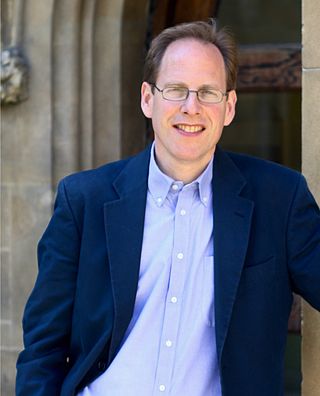
Mary Temple Grandin is an American academic and animal behaviorist. She is a prominent proponent of the humane treatment of livestock for slaughter and the author of more than 60 scientific papers on animal behavior. Grandin is a consultant to the livestock industry, where she offers advice on animal behavior, and is also an autism spokesperson.

Sir Simon Philip Baron-Cohen is a British clinical psychologist and professor of developmental psychopathology at the University of Cambridge. He is the director of the university's Autism Research Centre and a Fellow of Trinity College.

Monotropism is a person's tendency to focus their attention on a small number of interests at any time, tending to miss things outside of this attention tunnel. This cognitive strategy has been posited as the central underlying feature of autism. The theory of monotropism was developed by Dinah Murray, Wenn Lawson and Mike Lesser starting in the 1990s, and first published in 2005. Lawson's further work on the theory formed the basis of his PhD, Single Attention and Associated Cognition in Autism, and book The Passionate Mind published in 2011.

Neurodiversity is a framework for understanding human brain function and mental illness. It argues that diversity in human cognition is normal and that some conditions classified as mental disorders are differences and disabilities that are not necessarily pathological.

The autism rights movement, also known as the autistic acceptance movement, is a social movement allied with disability rights that emphasizes a neurodiversity paradigm, viewing autism as a disability with variations in the human brain rather than as a disease to be cured. The movement advocates for several goals, including greater acceptance of autistic traits and behaviors; reforms of services - i.e. services that focus on improving quality of life and well-being instead of suppression and masking of autistic traits that are adaptive or not harmful or imitations of social behaviors of neurotypical (non-autistic) peers ; the creation of social networks and events that allow autistic people to socialize on their own terms; and the recognition of the autistic community as a minority group.

Autistic Pride Day is a pride celebration for autistic people held on 18 June each year. Autistic pride recognises the importance of pride for autistic people and its role in bringing about positive changes in the broader society.
The refrigerator mother theory, also known as Bettelheim's theory of autism, is a largely abandoned psychological fringe theory that the cause of autism is a lack of parental, and in particular, maternal emotional warmth. Evidence against the refrigerator mother theory began in the late 1970s, with twin studies suggesting a genetic etiology, as well as various environmental factors. Modern research generally agrees that there is a largely epigenetic etiology of autism spectrum disorders.
The following outline is provided as an overview of and topical guide to autism:
Mind-blindness, mindblindness or mind blindness is a theory initially proposed in 1990 that claims that all autistic people have a lack or developmental delay of theory of mind (ToM), meaning they are unable to attribute mental states to others. According to the theory, a lack of ToM is considered equivalent to a lack of both cognitive and affective empathy. In the context of the theory, mind-blindness implies being unable to predict behavior and attribute mental states including beliefs, desires, emotions, or intentions of other people. The mind-blindness theory asserts that children who delay in this development will often develop autism.
The weak central coherence theory (WCC), also called the central coherence theory (CC), suggests that a specific perceptual-cognitive style, loosely described as a limited ability to understand context or to "see the big picture", underlies the central issue in autism and related autism spectrum disorder. Autism is a neurodevelopmental disorder characterized by impaired social interaction and communication, repetitive behaviours, restricted interests, and sensory processing issues.

Uta Frith is a German-British developmental psychologist and Emeritus Professor in Cognitive Development at the Institute of Cognitive Neuroscience at University College London (UCL). She pioneered much of the current research into autism and dyslexia. Her book Autism: Explaining the Enigma introduced the cognitive neuroscience of autism. She is credited with creating the Sally–Anne test along with fellow scientists Alan Leslie and Simon Baron-Cohen. Among students she has mentored are Tony Attwood, Maggie Snowling, Simon Baron-Cohen and Francesca Happé.
Michael John Lesser was a mathematical philosopher and political activist.

Societal and cultural aspects of autism or sociology of autism come into play with recognition of autism, approaches to its support services and therapies, and how autism affects the definition of personhood. The autistic community is divided primarily into two camps; the autism rights movement and the Pathology paradigm. The pathology paradigm advocates for supporting research into therapies, treatments, and/or a cure to help minimize or remove autistic traits, seeing treatment as vital to help individuals with autism, while the neurodiversity movement believes autism should be seen as a different way of being and advocates against a cure and interventions that focus on normalization, seeing it as trying to exterminate autistic people and their individuality. Both are controversial in autism communities and advocacy which has led to significant infighting between these two camps. While the dominant paradigm is the pathology paradigm and is followed largely by autism research and scientific communities, the neurodiversity movement is highly popular among most autistic people, within autism advocacy, autism rights organizations, and related neurodiversity approaches have been rapidly growing and applied in the autism research field in the last few years.

Autism Speaks Inc. is a non-profit autism awareness organization and the largest autism research organization in the United States. It sponsors autism research and conducts awareness and outreach activities aimed at families, governments, and the public. It was founded in February 2005 by Bob Wright and his wife Suzanne, a year after their grandson Christian was diagnosed with autism. The same year as its founding, the organization merged with Autism Coalition for Research and Education. It then merged with the National Alliance for Autism Research in 2006 and Cure Autism Now in 2007.

Autism, formally called autism spectrum disorder (ASD) or autism spectrum condition (ASC), is a neurodevelopmental disorder marked by deficits in reciprocal social communication and the presence of restricted and repetitive patterns of behavior. Other common signs include difficulty with social interaction, verbal and nonverbal communication, along with perseverative interests, stereotypic body movements, rigid routines, and hyper- or hyporeactivity to sensory input. Autism is clinically regarded as a spectrum disorder, meaning that it can manifest very differently in each person. For example, some are nonspeaking, while others have proficient spoken language. Because of this, there is wide variation in the support needs of people across the autism spectrum.
Autism spectrum disorders (ASDs) or autism spectrum conditions (ASCs) describe a range of conditions classified as neurodevelopmental disorders in the DSM-5, used by the American Psychiatric Association. As with many neurodivergent people and conditions, the popular image of autistic people and autism itself is often based on inaccurate media representations. Additionally, media about autism may promote pseudoscience such as vaccine denial or facilitated communication.
Fern Marie Brady is a Scottish comedian, podcaster, and writer. Before becoming a stand-up comedian Brady worked as a journalist. She achieved fame as a stand-up comedian by entering stand-up competitions such as at the Edinburgh Fringe Festival. As a result of her success as a stand-up she was invited on to comedy panel shows such as 8 Out of 10 Cats. In 2020 she became a podcaster when she co-created a podcast entitled Wheel of Misfortune.
The history of autism spans over a century; autism has been subject to varying treatments, being pathologized or being viewed as a beneficial part of human neurodiversity. The understanding of autism has been shaped by cultural, scientific, and societal factors, and its perception and treatment change over time as scientific understanding of autism develops.
Morénike Giwa Onaiwu is an American educator, author, and autism and HIV advocate. Alongside E. Ashkenazy and Lydia Brown, Onaiwu is an editor of All the Weight of Our Dreams, an anthology of art and writing entirely by autistic people of color published by the Autism Women's Network in June 2017.

Damian Elgin Maclean Milton is a British sociologist and social psychologist who specialises in autism research and an autism rights advocate. He is a lecturer at the University of Kent as well as a consultant for the United Kingdom's National Autistic Society and has academic qualifications in sociology, psychology, philosophy, and education.








